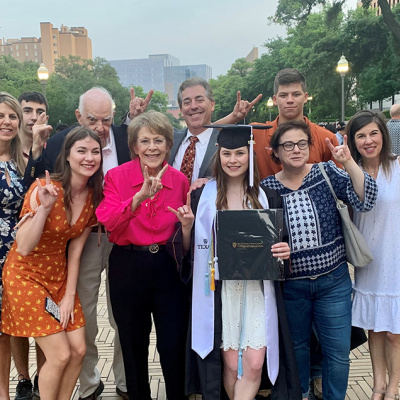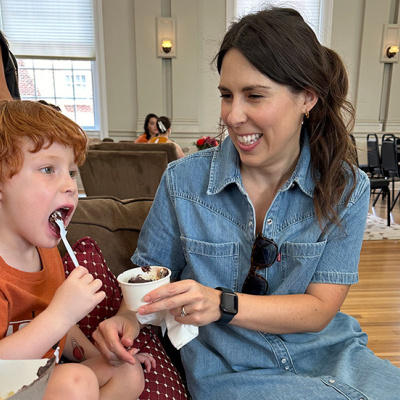A Michener Center Grad Makes Her Literary Debut

Domenica Ruta's gripping new memoir, With or Without You, hits stores today. A survivor’s story of domestic abuse and addiction, it centers on the author’s complicated relationship with her mother. The debut book has already garnered significant buzz.
Kevin Kautzman met with Ruta, MFA ’08, in Brooklyn to discuss the book, her time at UT's Michener Center for Writers, and the best piece of writing advice she’s received.
So where are you living now?
Around the corner. It’s the cliché and I don’t care that I’m a writer in Brooklyn. There’s a reason writers come here. It’s a good life for us. I was living in Boston for a while. Boston’s home—I’ll always have home. But it wasn’t working for me, so I came here, and I’ve made lots and lots of friends without trying.
“Candid” is a word for With or Without You. “Unflinching” also. How has your family reacted?
It’s been interesting. It’s not what I expected at all. It’s still new, so it could be different tomorrow. Tomorrow could be a different storm of emotions. There was a lot of grief. Everybody was really sad. There was stuff that they didn’t realize about my life, my childhood, but ultimately they all just liked the story and the writing. My sister and brother gave me the greatest compliment: “I would have read this if it had been about anyone else. It wasn’t because it was about you.” And my stepmother loved it.“You nailed me, Nicki!” I was scared she’d be angry, but she was just sort of accepting. And she loved it.
The heart of With or Without You is the fraught mother-daughter relationship. There's a turning point when you make the decision to stop communicating with her. Have you spoken with her since writing the memoir?
I’m working toward that—but I’m not there yet. I would love to do that one day, but we’ll see if that’s ever possible.
It seems disconnecting from your mother was something you absolutely had to do to move into recovery.
It remains the thing I’m most conflicted about in my life. Every time something good happens, my first instinct is to call and tell her, “Mom, oh my God, I’m being interviewed at this diner!” Because there’s a part of her that would be absolutely elated and proud and hilarious, but there’s another part of her that would be nasty and mean and destructive, and I’m not strong enough to deal with that yet.
Your description of the culture among the writers at the Michener Center is memorable. You describe the Michener Fellowship—which is extremely generous as far as creative writing MFAs go—as “absurd.”
It’s absurd! I had never had a job that did direct deposit, and I had never had a job that paid as much as the Center paid me at that point. So it was like magical money. Money would just appear in my checking account and I would be like, "What?! How is this possible?" And it happened every month.

When you arrived at the Michener Center, had you planned to write a memoir?
No. No no no. I hadn’t even read memoirs. I think I had this misogynistic, self-hating aversion to memoirs. Uck, I don’t want to read another story about a little girl lost. Woe is me. When you read a lot of memoirs, though, very few are actually like that. They’re usually very smart stories about survivors, but I was just so uncomfortable about my place in the world and my own story that I didn’t want to have anything to do with that. I wrote fiction.
Brian McGreevy, a very successful graduate of the Michener Center, told me I was stupid, I was crazy not to write a memoir. He said, “Writing a memoir for you is like screenwriting for me. What I love is fiction, but I don’t write the kind of fiction that anyone’s going to freak out about, or that will create a sustainable career. But I can do that in film, and you can do that in memoir and fund your fiction on this.” It made a lot of pragmatic sense.
It actually reads like a well-wrought novel. The prose is as fun to read.
I started thinking about the chapters as short stories, because I hadn’t had much success writing a novel, and thinking of the chapters as self-contained stories with this forward progression and larger arc really opened up a lot for me.
How do you feel about success?
My only goal ever—and I learned this at the Michener Center—is sustainability. I want to extend the Michener life to the rest of my life. I want to wake up and have the primary focus be writing and reading. And by writing I mean napping, walking my dog, and thinking about writing, all those things. That is success: that I get to wake up and be a writer. [pullquote]That is success: that I get to wake up and be a writer.[/pullquote] I would have done this memoir for free. I mean, back in the day when I was cleaning houses, I sold two short stories to tiny little literary magazines, and it was the most life-sustaining thing in the world to get that letter saying, “We are pleased to say we want to publish your story.”
I understand you’re working on a novel now. Care to talk about it?
It’s awful. Oh my God it’s so awful. My biggest fear is that I don’t want to die and have someone find it and say, “Oh, look, it’s her novel!” Nobody can see this novel for at least another two years—and then I can die.
[With or Without You] was awful too, but then a couple years later it was better. So that gives me hope.
With or Without You is also on audiobook. Did you do the read?
[Laughs]. I did. Please never listen to it. I’m so embarrassed.
What’s the best piece of writing advice you’ve ever received?
I hated it at the time. I resented it and was furious about it, but Colm Tóibín was a teacher at the Michener Center, and he would say, “When you’re working on something, and you think you’ve got it, put your head down and tell yourself: try harder.” That comes up a lot. Whenever I feel satisfied with something I’ve done, I remind myself to go back and try harder. I hated it when he said it and now it’s my mantra. Try harder. Try harder.
With or Without You is out in hardcover (and audiobook) today, and Ruta will be in conversation with Brian McGreevy at Book People in Austin on March 6 at 7 p.m.
Kevin Kautzman is a third-year Michener Fellow, pursuing an M.F.A. in playwriting and screenwriting.
Domenica Ruta photo by Meredith Zinner.






